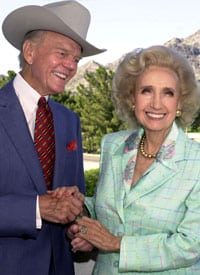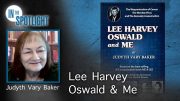
Born Paul Harvey Aurandt in Tulsa in 1918, he started his radio career as a high schooler there before moving on to other radio jobs in several Midwestern cities. In St. Louis, he met Lynne Cooper, proposed on their first date, and married her in 1940. Lynne, who always worked side by side with her husband as his producer and business manager, died in 2008.
Harvey joined the Army shortly after Pearl Harbor and then settled in Chicago, his home base for the next 60 years. In 1951, ABC bought the station where he worked and began to send his Monday-through-Friday news and commentary show coast-to-coast. At its peak, the Paul Harvey 15 minutes could be heard on 1,300 stations with a listening audience of more than 20 million daily.
He let listeners know that he didn’t like welfare cheats and did support the death penalty. His major concerns were debt, too much government, bureaucrats, permissive parents, and leftist radicals. Usually a strong complainer about moral decay, he nevertheless supported his wife’s wishes and backed both abortion and the Equal Rights Amendment. He never missed an opportunity to promote rugged individualism and love of God and country.
An early supporter of Senator Joseph McCarthy, he became persuaded that the senator was hurting innocent people and backed away. He strongly opposed busing of students as the supposed way to foster integration. Perhaps his greatest turnabout occurred in 1970 when, after heavy support for the Vietnam War, he reversed course and began a suggestion to President Nixon with “Mr. President, I love you … but you’re wrong.” Many listeners complained, but he remained convinced that it was time to bring the troops home from a war whose goal wasn’t victory.
In 1976, Harvey began his “The Rest of the Story” vignettes in addition to his newscasts. His only child, Paul Harvey, Jr., did much of the research for this very popular teaser that didn’t identify the person being described until the very end of each five-minute spot.
He tried television but didn’t care for it, saying that he hoped “someone would discover that television causes cancer.” A bit of a wordsmith, he is credited with such terms as “Reaganomics,” “skyjackers,” and “guesstimate.” A great salesman for the products that fueled his show, he claimed never to have promoted something he didn’t trust.
A 2005 recipient of a Presidential Medal of Freedom from President George W. Bush, both he and his wife were inducted into the Radio Hall of Fame. With Paul Harvey’s death, radio has lost one of its brightest stars.
Photo of Paul Harvey with wife Lynne: AP Images



